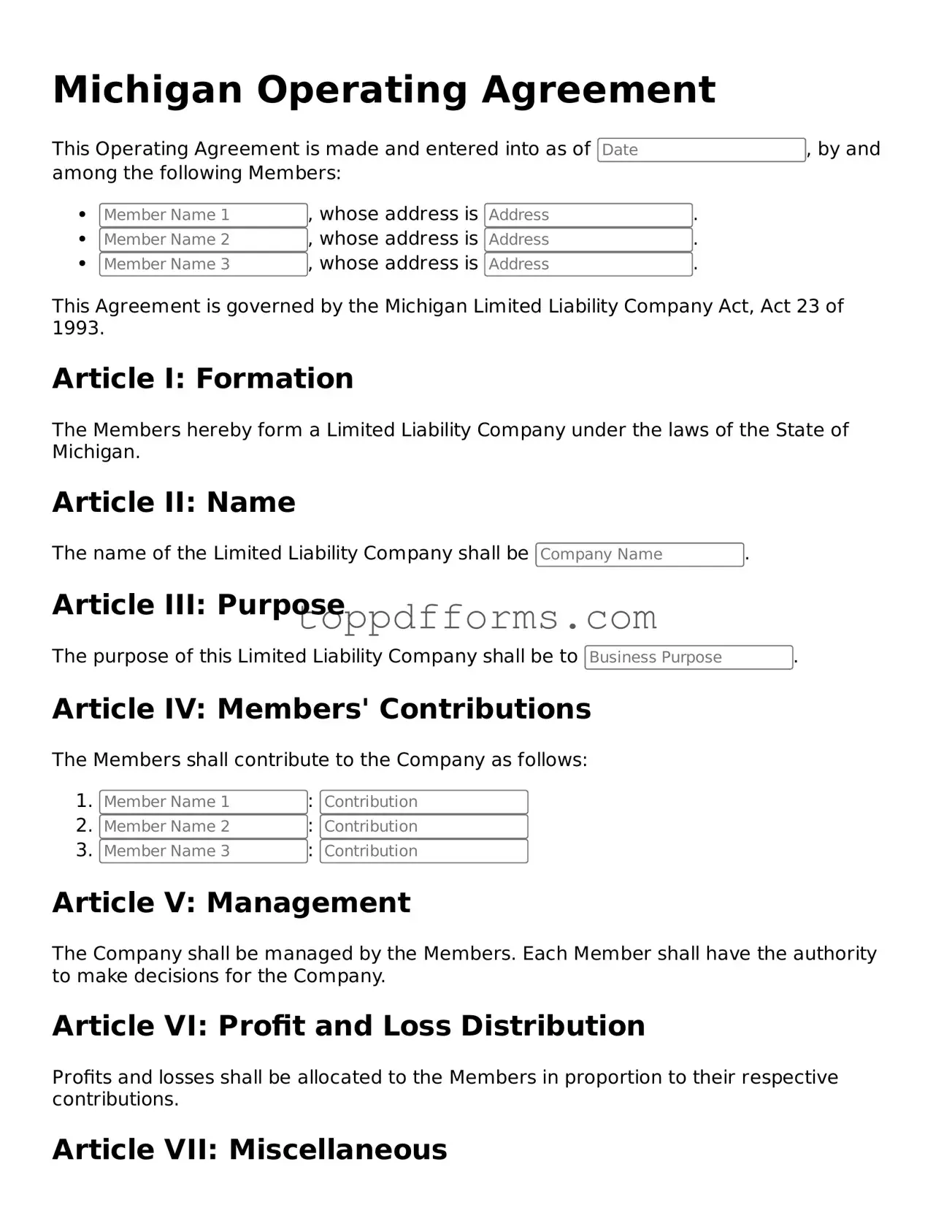Operating Agreement Document for Michigan State
Things You Should Know About This Form
What is a Michigan Operating Agreement?
A Michigan Operating Agreement is a legal document that outlines the ownership and operating procedures of a Limited Liability Company (LLC) in Michigan. It serves as an internal guideline for the members of the LLC, detailing how the business will be managed, how profits and losses will be distributed, and the responsibilities of each member. While not required by state law, having an Operating Agreement is highly recommended as it helps prevent misunderstandings among members and provides a clear framework for decision-making.
Who should create an Operating Agreement?
All LLC members in Michigan should create an Operating Agreement, regardless of the size of the company or the number of members involved. This document is particularly important for multi-member LLCs, as it clarifies each member’s role and ownership percentage. Even single-member LLCs can benefit from having an Operating Agreement, as it helps establish the business as a separate legal entity and can provide protection in case of legal disputes or audits.
What should be included in a Michigan Operating Agreement?
A comprehensive Michigan Operating Agreement should include several key elements. First, it should outline the name of the LLC and its principal address. Next, the agreement should detail the purpose of the business and the duration of the LLC. Additionally, it should specify the ownership structure, including each member's capital contributions and ownership percentages. Other important components include the management structure, voting rights, procedures for adding or removing members, and how profits and losses will be allocated. Finally, the agreement should address how disputes will be resolved and any amendments to the agreement in the future.
Is it necessary to file the Operating Agreement with the state?
No, in Michigan, you do not need to file your Operating Agreement with the state. This document is kept internally among the members of the LLC. However, it is crucial to have a written agreement in place, as it can serve as evidence in legal matters or disputes. Members should keep the Operating Agreement in a safe place and review it regularly to ensure it remains up to date with the business’s needs and any changes in the law.
PDF Overview
| Fact Name | Details |
|---|---|
| Governing Law | The Michigan Operating Agreement is governed by the Michigan Limited Liability Company Act. |
| Purpose | This agreement outlines the management structure and operating procedures of an LLC. |
| Member Roles | It defines the roles and responsibilities of the members within the LLC. |
| Profit Distribution | The agreement specifies how profits and losses will be distributed among members. |
| Amendments | It provides a framework for how amendments to the agreement can be made. |
| Dispute Resolution | The agreement may include provisions for resolving disputes among members. |
| Flexibility | Michigan law allows for flexibility in how an Operating Agreement is structured, accommodating various business needs. |
Common mistakes
When filling out the Michigan Operating Agreement form, many individuals make common mistakes that can lead to complications down the line. One frequent error is failing to include all members' names and addresses. This omission can create confusion about who is involved in the business and can complicate decision-making processes. Ensure that every member is listed clearly to avoid any misunderstandings.
Another mistake often seen is not specifying the management structure of the LLC. Some people assume that the default management structure will suffice, but this can lead to disputes later. Clearly outline whether the LLC will be member-managed or manager-managed. This clarity helps in establishing roles and responsibilities from the start.
Additionally, many individuals neglect to define the distribution of profits and losses. Without a clear agreement on how profits will be shared, disagreements may arise among members. It’s crucial to specify percentages or methods for distribution to ensure everyone is on the same page.
Lastly, failing to update the Operating Agreement when changes occur is a common oversight. Life circumstances and business needs evolve, and the agreement should reflect these changes. Regularly review and amend the document as necessary to keep it current and relevant.
Other Common State-specific Operating Agreement Forms
Florida Multi Member Llc Operating Agreement Template - An Operating Agreement can greatly enhance professional credibility.
Creating an Operating Agreement - The agreement can specify deadlines for financial reports or audits.
For those seeking to safeguard sensitive information in business agreements, a reliable resource is the effective Non-disclosure Agreement for Colorado transactions. This form not only outlines crucial confidentiality terms but also ensures compliance with local legal standards, promoting trust in professional relationships.
Operating Agreement Ohio - Incorporates member buyout procedures if needed.
